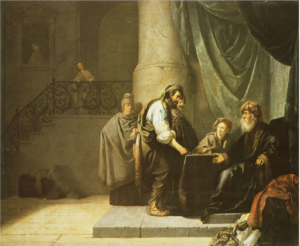Thoughts on Sunday’s Lessons for Nov. 19, 2017

The Parable of The Talents. Oil on panel by Willem de Poorter (1608-1668). Narodni Galerie, Prague.
(Click image to enlarge.)
Advent doesn’t begin until December 3, but we already are hearing readings that point our imagination toward God’s final judgement in the last days, an ancient echo of a once-longer Advent season. Our first reading, though, wraps up our Pentecost-long travels with the chosen people, who now inhabit the promised land, governed by leaders called judges – in this reading, a powerful female judge named Deborah. They have settled in to a cycle of behaving badly – “doing what was evil in the sight of the Lord” – and suffering the consequences, in this case military loss, before repenting, turning back, and enjoying blessings as they restore justice.
First Reading (Track Two): Zephaniah 1:7, 12-18
The minor prophet Zephaniah foretold the destruction and exile of the Northern Kingdom, Israel, for its peoples’ and their leaders’ failure of righteousness: They pursued wealth and fell away from following God’s ways. His apocalyptic vision of the Great Day of the Lord seems to foreshadow the vision of Revelation, as he imagines a horrifying Judgement Day, when their gold and riches won’t save them from reaping what they sowed: A fire of passion that will consume all the earth and all the people in it.
Psalm (Track One): Psalm 123
Harmonizing with the leadership of the female judge Deborah in the first reading, this brief but powerful Psalm – one of the shortest of all the Psalms at just five verses – offers worship and praise to a God clearly seen as both male and female, both master and mistress. We see here, too, a reminder of the covenant promise that the people of Israel repeatedly broke when they “did what was evil in the sight of the Lord,” contemptuously ignoring the poor as they accumulated riches.
Psalm (Track Two): Psalm 90:1-12
Our time is nothing like God’s time. While we see a thousand years slowly pass, generation after generation, it all goes by in a moment for God, who remains from age to age, present before the mountains, the land, and the earth were born. Our lives, in contrast, the Psalmist sings, “pass away quickly and we are gone,” like grass that dries up in a day in the desert heat. We pray with the Psalmist that God may help us learn to make wise use of our time.
Second Reading: 1 Thessalonians 5:1-11
Wrapping up his short letter to the people of Thessalonika, Paul tells them that the day of the Lord is coming, and urges them to be prepared. Using colorful metaphors – a thief coming in the night, a woman surprised by sudden labor pains – he warns that the last day will come suddenly and by surprise. Be faithful, he says; be loving. Don’t spend the night drunk, but live in the day, sober and watchful. Continue to care for one another, encourage each other, build each other up, he urges, “as indeed you are doing.”
Gospel: Matthew 25:14-30
Many of us would probably be just as cautious in safeguarding an angry master’s treasure as was the third slave who buried and made no profit on the expensive silver talent left in his charge. But look at the context of this parable in Matthew’s Gospel, only a day or two before Jesus is to be crucified: Jesus is focused on the last days. Just after this passage is the Gospel we will hear next week: Jesus’ account of the last judgement, when Christ as judging King will sort out those who saw the face of Jesus in the hungry, the thirsty, the oppressed, sick persons and prisoners from those who did not. Jesus wants us, like the first two slaves, to take risks, see him present in the poor and the oppressed, and give of ourselves abundantly.
What are “Track 1” and “Track 2”?
During the long green season after Pentecost, there are two tracks (or strands) each week for Old Testament readings. Within each track, there is a Psalm chosen to accompany the particular lesson.
The Revised Common Lectionary allows us to make use of either of these tracks, but once a track has been selected, it should be followed through to the end of the Pentecost season, rather than jumping back and forth between the two strands.
For more information from LectionaryPage.net, click here.
